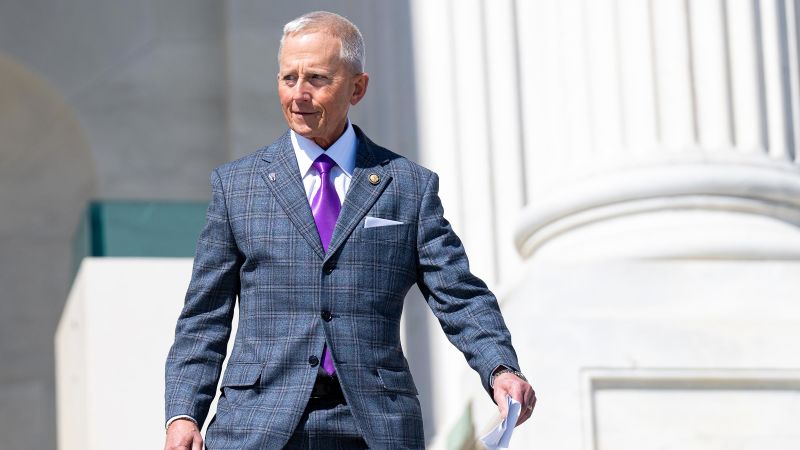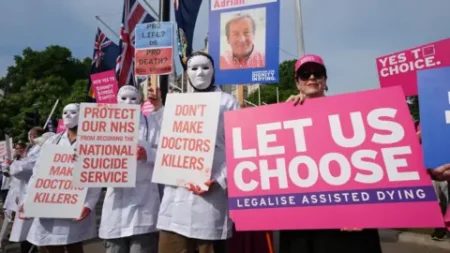The political landscape in the House of Representatives is shifting as a significant faction of moderate Republicans, often termed the centrists, is poised to challenge the hardline agenda traditionally driven by the party’s right wing. Under the leadership of Speaker Mike Johnson, the Republicans are grappling with the tensions arising from their razor-thin majority—a situation that historically has allowed hardline GOP members to influence the legislative agenda heavily. The center of the party, however, has begun to assert itself, signaling that it will no longer accept unilateral decisions imposed by the party’s far-right members.
As Congress reconvenes after a break, the focus shifts to the monumental task of drafting President Donald Trump’s first policy package. Centrists, who now represent a sizeable bloc within the Republican conference, have clearly stated that they refuse to be sidelined in negotiations. Representative Mike Lawler of New York, who played a significant role in flipping a critical seat for the GOP in the 2022 elections, has voiced the sentiments of many within this group, indicating a shift in the party dynamics. “We are not going to be bullied,” Lawler declared, emphasizing that their influence contributed to the party’s current majority.
The frustration among centrist Republicans revolves around a longstanding trend where the party’s right-wing members have dominated discussions and policy outcomes. With a fierce electoral battle looming in the 2026 midterms, centrists fear that their party’s strategy, characterized by a refusal to compromise, could jeopardize their majority. They are particularly concerned about the proposed cuts to vital programs like Medicaid—an issue that has attracted intense scrutiny as budget discussions begin in earnest.
Medicaid, in particular, has become a contentious point as some GOP members seek significant cuts to government spending, targeting a staggering $1.5 trillion reduction across various programs. Centrists argue that health care services like Medicaid are fundamental to their constituents, and maintaining support for such programs is non-negotiable. They have outlined various priorities beyond Medicaid, including federal nutrition programs and tax deductions, all of which are set to be hotly debated in the coming weeks.
Within the centrist faction, Representative Jeff Van Drew has emerged as a notable voice advocating for the preservation of Medicaid benefits. Having communicated directly with Trump about these concerns, Van Drew has joined other members in a rare public request to leadership to safeguard health program benefits. He has made it clear that he will not support any legislation that threatens cuts to eligible recipients, calling such actions detrimental to the party’s future and its relationship with voters.
As the clock ticks down to the deadline for releasing their policy draft, the Republicans face mounting internal angst. The Energy and Commerce Committee is tasked with identifying savings and is expected to present a proposal that details how they plan to manage such deep cuts without alienating key voter groups. With over 80 million Americans enrolled in Medicaid—many of whom are Trump supporters—the stakes are incredibly high. The Democrats are already primed to leverage this issue against Republicans in the upcoming elections.
Moreover, Trump’s recent comments indicating a willingness to veto any bill that negatively affects essential social programs add another layer of complexity to the Republicans’ strategy. Amidst these pressures, some Republicans have suggested potential reforms that could cut costs while avoiding adverse effects on beneficiaries, such as imposing work requirements or requiring periodic eligibility re-evaluations. However, these proposals may not satisfy all factions within the party.
In parallel, the ongoing debate over the state and local tax (SALT) deduction, particularly affecting Republicans from high-tax states like New York and New Jersey, adds further tension. These members are adamant that any budget proposals must address the SALT limitations imposed by the previous tax overhaul. There’s an underlying belief that without significant changes to SALT, crucial votes may be lost, particularly from members like Lawler and his fellow New Yorker Nick LaLota.
As the House leadership prepares for a potential vote on the initial drafts of Trump’s agenda, it remains uncertain whether they can reconcile these deep divisions among Republicans. While there may be aspirations to expedite the legislative process, the harsh realities of Senate negotiations may delay progress significantly, causing trepidation among GOP centrists concerned about the implications of tying their political fortunes to a contentious policy that may ultimately falter in the Senate.
In summary, the upcoming months will be pivotal for the Republican Party, as they navigate a landscape filled with internal conflict and external pressures. The balancing act of ensuring party unity while addressing the legitimate concerns of moderates and hardliners alike will define their strategy going forward. Ultimately, the drive for compromise may determine not only the success of their legislative agenda but also their political survival in the challenging electoral periods ahead.










